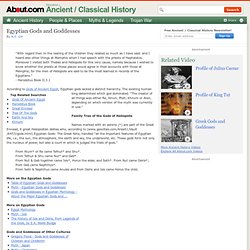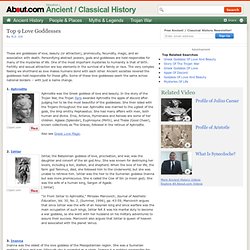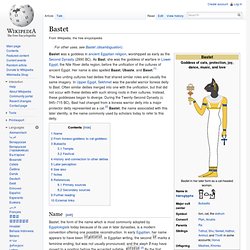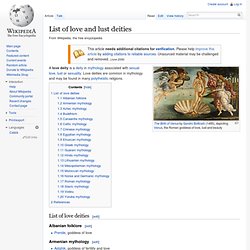

Egyptian Gods and Goddesses. "With regard then to the rearing of the children they related so much as I have said: and I heard also other things at Memphis when I had speech with the priests of Hephaistos.

Moreover I visited both Thebes and Heliopolis for this very cause, namely because I wished to know whether the priests at these places would agree in their accounts with those at Memphis; for the men of Heliopolis are said to be the most learned in records of the Egyptians. " - Herodotus Book II.3.1 According to Gods of Ancient Egypt, Egyptian gods lacked a distinct hierarchy.
The existing human king determined which god dominated. "The creator of all things was either Re, Amun, Ptah, Khnum or Aten, depending on which version of the myth was currently in use. " Family Tree of the Gods of Heliopolis From Atum* or Re came Tefnut* and Shu*. Love Goddesses - Ancient Fertility and Love Goddesses.
These are goddesses of love, beauty (or attraction), promiscuity, fecundity, magic, and an association with death.

Personifying abstract powers, gods and goddesses are held responsible for many of the mysteries of life. One of the most important mysteries to humanity is that of birth. Fertility and sexual attraction are key elements in the survival of a family or race. The very complex feeling we shorthand as love makes humans bond with each other. Ancient societies revered the goddesses held responsible for these gifts. 1.
Clipart.com Aphrodite was the Greek goddess of love and beauty. Also see Greek Love Magic. 2. Ishtar, the Babylonian goddess of love, procreation, and war, was the daughter and consort of the air god Anu. 3. Inanna was the oldest of the love goddess of the Mesopotamian region. "Matronit: The Goddess of the Kabbala," by Raphael Patai. 4. Ashtart or Astarte is a Semitic goddess of sexual love, maternity and fertility, consort of El at Ugarit. 5. 6. 7. 8. 9. Bastet. Photograph of an alabaster cosmetic jar topped with a lioness, representing Bast, an 18th dynasty burial artifact from the tomb of Tutankhamun circa 1323 BC - Cairo Museum Bastet was a goddess in ancient Egyptian religion, worshipped as early as the Second Dynasty (2890 BC).

As Bast, she was the goddess of warfare in Lower Egypt, the Nile River delta region, before the unification of the cultures of ancient Egypt. Her name is also spelled Baast, Ubaste, and Baset.[1] The two uniting cultures had deities that shared similar roles and usually the same imagery. In Upper Egypt, Sekhmet was the parallel warrior lioness deity to Bast.
Name[edit] Bastet, the form of the name which is most commonly adopted by Egyptologists today because of its use in later dynasties, is a modern convention offering one possible reconstruction. During later dynasties, Bast was assigned a lesser role in the pantheon bearing the name Bastet, but retained. She is also known as The Eye of Ra. Bubastis[edit] Temple[edit] List of love and lust deities. A love deity is a deity in mythology associated with sexual love, lust or sexuality.

Love deities are common in mythology and may be found in many polytheistic religions. List of love deities[edit] Albanian folklore[edit] Prende, goddess of love Armenian mythology[edit] Astghik, goddess of fertility and love Aztec mythology[edit] Xochiquetzal, goddess of fertility, beauty, female sexual power, protection of young mothers, pregnancy, childbirth, and women's craftsXochipilli, god of love, art, games, beauty, dance, flowers, maize, fertility, and songTlazolteotl, goddess of lust, carnality, sexual misdeedsIxcuiname, goddess of the carnality. Buddhism[edit] Aizen Myō-ō or Rāgarāja, a deity who transforms worldly lust into spiritual awakening; his red-skinned appearance represents suppressed lust and passion Canaanite mythology[edit] Astarte, goddess of sexual love, fertility, and warfareQetesh, goddess of love, beauty and sex Celtic mythology[edit] Chinese mythology[edit] Egyptian mythology[edit]